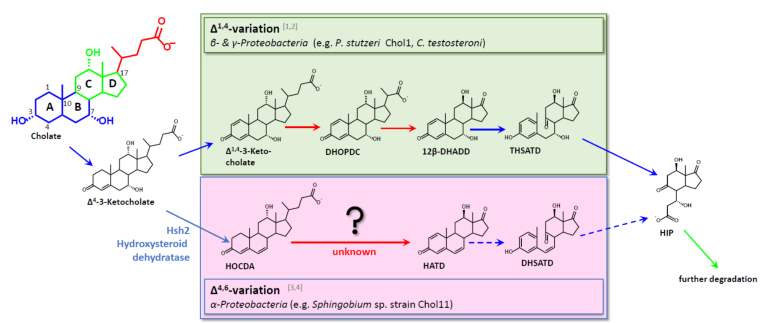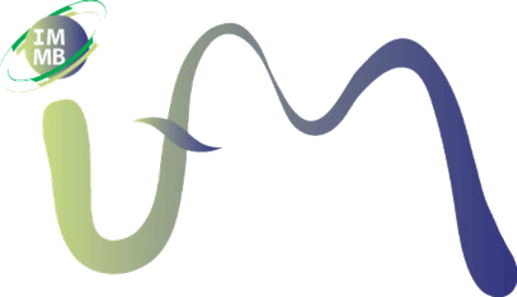Team
- Julio César Coutiño-Montes
- Adrián Rodrigo Fuentes Miranda
- Antonia Bruder
- Johannes Holert
Topic
Steroids are ubiquitous organic compounds with diverse functions in eukaryotic organisms. In bacteria, steroids occur only as rare exceptions. However, many bacteria are able to transform and degrade steroid compounds as part of the global carbon cycle. Bacterial transformation of steroids is also an essential part of the biotechnological production of steroid hormones. We study bacterial steroid metabolism with different model organisms and bile salts, which are surface-active steroids produced and excreted by all vertebrates, as a model substrates.
The goals of our research is understand the molecular physiology of bacterial steroid degradation in an ecological context. We are also interested in the degradation of synthetic steroids, which can act as endocrine disruptors. In addition, we want to use knowledge about bacterial steroid metabolism for engineering novel bacterial biocatalysts for biotechnological steroid production.
Our research has shown that there are apparently two major routes for bacterial degradation of bile acids: The Δ1,4-pathway variant that is used by most steroid degrading bacteria such as actinobacteria (Mycobacterium, Rhodococcus) proteobacteria (Pseudomonas, Comamonas). In contrast, the Δ4,6-pathway variant seems to be mainly restricted to bacteria belonging to the family of the Sphingomonadaceae. The elucidation of the largely unexplored the Δ4,6-pathway is currently in the focus of our current research.

Cholate degradation in Pseudomonas sp. strain Chol1 as an example for bacterial degradation of steroids© AG Philipp Funding
- DFG (PH71/3-1, 3-2 and 6-1)
- DAAD
- Industrial cooperation
- Fraunhofer IME
Publications
Review articles:
Feller FM, Holert J, Yücel O, Philipp B (2021) Degradation of bile acids by soil and water bacteria.
Microorganisms 2021, 9(8), 1759; https://doi.org/10.3390/microorganisms9081759Philipp B (2011) Bacterial degradation of bile salts.
Applied Microbiology and Biotechnology 89: 903-915. doi: 10.1007/s00253-010-2998-0Selected Original Papers:
Feller FM, Eilebracht S, Nedielkov R, Yücel O, Alvincz J, Salinas G, Ludwig KC, Möller H, Philipp B (2021) Investigations on the Degradation of the Bile Salt Cholate via the 9,10-Seco-Pathway Reveals the Formation of a Novel Recalcitrant Steroid Compound by a Side Reaction in Sphingobium sp. Strain Chol11.
Microorganisms 2021, 9(10), 2146, https://doi.org/10.3390/microorganisms9102146Feller FM, Richtsmeier P, Wege M, Philipp B (2021) Comparative analysis of bile-salt degradation in Sphingobium sp. strain Chol11 and P. stutzeri Chol1 reveals functional diversity of proteobacterial steroid degradation enzymes and suggests a novel pathway for side-chain degradation.
Appl Environ Microbiol. 2021 Sep 1;AEM0145321.doi: 10.1128/AEM.01453-21Feller FM, Wöhlbrand L, Holert J, Schnaars V, Elsner L, Mohn WW, Rabus R, Philipp B (2021) Proteome, bioinformatic and functional analyses reveal a distinct and conserved metabolic pathway for bile salt degradation in the Sphingomonadaceae.
Appl. Environ. Microbiol. doi: 10.1128/AEM.00987-21Feller FM, Marke G, Drees SL, Wöhlbrand L, Rabus R, Philipp B (2021) Substrate inhibition of 5β-Δ4-3-ketosteroid dehydrogenase in Sphingobium sp. strain Chol11 acts as circuit breaker during growth with toxic bile salts.
Fron. Microbiol. doi: 10.3389/fmicb.2021.655312Mendelski MN, Dölling R, Feller FM, Hoffmann D, Ramos Fangmeier L, Ludwig KC, Yücel O, Mährlein A, Paul RJ, Philipp B (2019)
Steroids originating from bacterial bile acid degradation affect Caenorhabditis elegans and indicate poteinial risks for the fauna of manured soils.
Scientific Reports 9:11120. doi 10.1038/s41598-019-47476-yYücel O, Borgert SR, Poehlein A, Niermann K, Philipp B (2019) The 7α-hydroxysteroid dehydratase Hsh2 is essential for anaerobic degradation of the steroid skeleton of 7α-hydroxyl bile salts in the novel denitrifying bacterium Azoarcus sp. strain Aa7.
Environmental Microbiology 21: 800-813. doi: 10.1111/1462-2920.14508Yücel O, Holert J, Ludwig KC, Thierbach S, Philipp B (2017) A novel steroid-coenzyme A ligase from Novosphingobium sp. strain Chol11 is essential for an alternative degradation pathway for bile salts.
Applied and Environmental Microbiology 84(1): e01492-17. doi: 10.1128/AEM.01492-17Holert J, Yücel O, Jagmann N, Prestel A, Möller H, Philipp B (2016) Identification of bypass reactions leading to the formation of one central steroid degradation intermediate in metabolism of different bile salts in Pseudomonas sp. strain Chol1.
Enivronmental Microbiology 18: 3373-3389. doi: 10.1111/1462-2920.13192Holert J, *Yücel O, Suvekbala V, Kulic Z, Möller HM, Philipp B (2014)
Evidence of distinct pathways for bacterial degradation of the steroid compound cholate indicates the potential for metabolic interactions by interspecies cross-feeding.
Environmental Microbiology 16: 1424-1440. doi: 10.1111/1462-2920.12407
*These authors contributed equally to the paper.Holert J, Jagmann N, Philipp B (2013) The essential function of genes for a hydratase and an aldehyde dehydrogenase for growth of Pseudomonas sp. strain Chol1 with the steroid compound cholate indicates an aldolytic reaction step for deacetylation of the side chain.
Journal of Bacteriology 195: 3371-3380. doi: 10.1128/JB.00410-13Holert J, Kulic Z, Yücel O, Suvekbala V, Suter MJ-F, Möller H, Philipp B (2013)
Degradation of the acyl side chain of the steroid compound cholate in Pseudomonas sp. strain Chol1 proceeds via an aldehyde intermediate.
Journal of Bacteriology 195: 585-595. doi: 10.1128/JB.01961-12Birkenmaier A, Holert J, Erdbrink H, Möller H, Friemel A, Schönenberger R, Suter MJ-F, Klebensberger J, Philipp B (2007)
Biochemical and genetic investigation on initial reactions in aerobic degradation of the bile acid cholate in Pseudomonas sp. strain Chol1.
Journal of Bacteriology 189: 7165-7173. doi: 10.1128/JB.00665-07Philipp B, Erdbrink H, Suter MJF, Schink B (2006) Degradation of and sensitivity to cholate in Pseudomonas sp. strain Chol1.
Archives of Microbiology 185: 192-201. doi: 10.1007/s00203-006-0085-9

